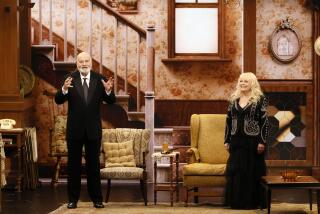Review: Netflix reboot of ‘One Day at a Time’ is bighearted fun
Norman Lear, who brought politics to three-camera comedy back in the 1970s, has remade his feminist family sitcom “One Day at a Time” for Netflix and the 21st century. Premiering Friday, with all 13 episodes available to binge, it preserves the domestically framed, socially engaged flavor of the original while mixing in new verve. And it has turned out very well: smart, fun, bighearted and less noisy and hectoring than Lear works of old could sometimes be.
In the original series, which ran from 1975 to 1984, Bonnie Franklin played a recently divorced mother moving to a new city with daughters Mackenzie Phillips (less conventional, more political) and Valerie Bertinelli (more conventional, less political). Building super Pat Harrington Jr. made it a figurative family of four.
In the new show, developed and run by Gloria Calderón Kellett (“How I Met Your Mother”) and Mike Royce (“Everybody Loves Raymond”) and filmed, as before, before a live audience, the setting has moved from Indianapolis to Echo Park; the family is now Cuban, which determines the details but is less the point than it would have been if this were 1975. (Gloria Estefan has set the show’s original theme song to a Cuban beat; it’s a natural fit.)
Justina Machado plays Penelope Alvarez, a former Army nurse and Afghan war vet, not divorced here, still the mother of two: daughter Elena (older, still the less conventional), played by Isabella Gomez and a son, Alex (Marcel Ruiz). The series gains an extra generation with Rita Moreno as Penelope’s spark-plug mother, Lydia; Moreno, a vital 85, is playing 70 here, which does not seem a stretch. (I imagine her contract stipulates that only so many minutes can elapse in any episode before she is allowed to dance.)
Schneider, still called Schneider, has been transformed from Harrington’s mustache-with-a-tool-belt to an aging rich kid (Todd Grinnell) who owns the building where the Alvarez family lives – a sort of playboy hipster who comes into a room full of Cuban Americans wearing a Che Guevara T-shirt and says, “Viva la revolution, am I right?” But, of course, he is only looking to belong. If anything, he is more of a presence than his predecessor, and he does do repairs.
As one would expect from the producer of “All in the Family,” “The Jeffersons” and “Maude,” there are plenty of issues raised, which are discussed or argued about at length — sexuality, sexism, PTSD, immigration, alcoholism, environmental concerns, religion and the lack of it — though within the mutually protective circle the characters inhabit, the arguments don’t last long. Story lines often lead to an endgame, common to Lear series, in which argument leads to revelation, which leads to understanding, which leads to connection.
It can be schematic or obvious at times. The political points are integrated into the action and given human warmth by a talented cast, but they are hardly disguised. (Subtlety was never Lear’s thing.) Each generation and gender gets its contrasting voice:
Elena: “Mom, I’m not talking about old-people sexism. It’s much more subtle now. Men assert their power through microagressions and mansplaining.” (At which point Schneider begins to mansplain mansplaining.)
Penelope: “If I got bent out of shape every time a man said something stupid, you wouldn’t be here.”
Lydia: “You will never win men over by confronting them. You flirt with them, you hypnotize them and then you do whatever the hell you want.”
Alex: “I’m glad I’m a guy so I don’t have to think about sexism.”
But there are also some standard sitcom complications and low burlesque, even dialect humor — jokes about Lydia’s pronunciation of “sheet mask,” a crack about “hot men out there with big packages” after a handsome delivery man departs.
The pilot, as pilots will, creaks a little under its burden of exposition and character-defining overstatement, but the series quickly finds its natural voice and rhythm. It is lively without being rushed — where the commercial-bearing half-hour sitcom has shrunk to 22 minutes, these episodes run several minutes longer; there are more beats to each story, and the beats go on. But generally, it makes the show feel richer, rather than overloaded. Minor characters (including Stephen Tobolowsky as the doctor Penelope works for) get more room to express themselves. Conversations drift a little. There is time to cook, to make coffee — and, yes, to dance.
‘One Day at a Time’
Where: Netflix
When: Anytime, as of Friday
Rating: TV-PG (may be unsuitable for young children)
Follow Robert Lloyd on Twitter @LATimesTVLloyd
More to Read
The complete guide to home viewing
Get Screen Gab for everything about the TV shows and streaming movies everyone’s talking about.
You may occasionally receive promotional content from the Los Angeles Times.







